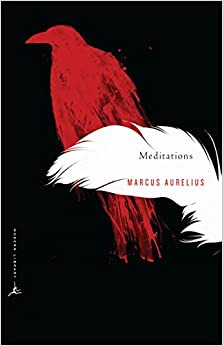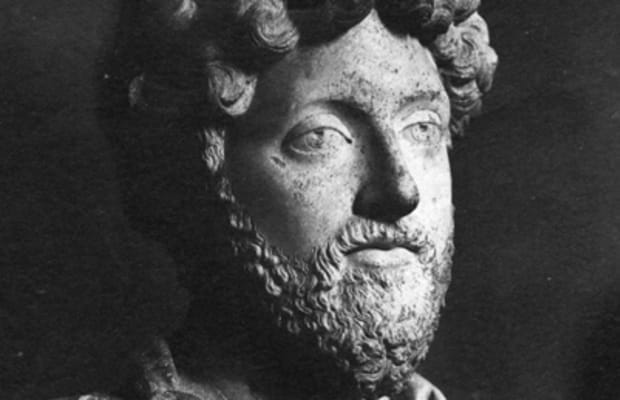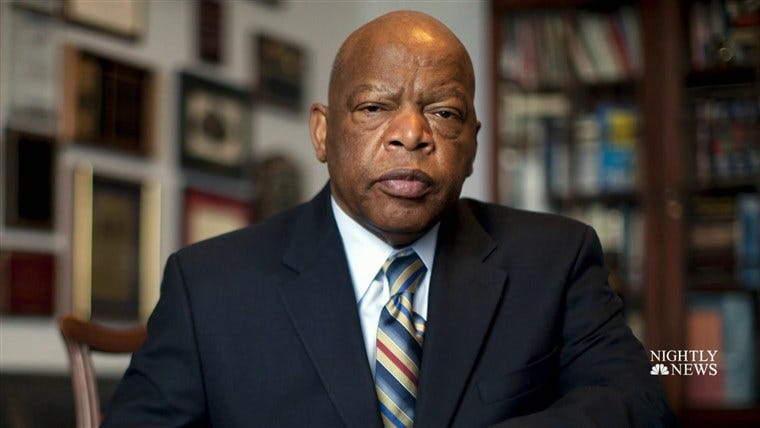Meditations
Tippets by Taps #142: Marcus Aurelius, John Lewis, Ant Financial, podcasts and more. Enjoy!
Welcome to the 38 new Tippets readers who have subscribed over the past week! A big thank you to those of you who shared the newsletter. If you're reading this, not yet subscribed, and looking to receiving Tippets alongside the other similarly curious, intelligent people who've already subscribed, click below! 😄
There are books that, without the requisite life experience, enough life lived, will simply not resonate. I recently read Meditations by Marcus Aurelius on the recommendation of (more than) a few friends. Had I encountered this collection of personal essays earlier in life, I would have almost certainly failed to grapple with its weight.
If alive today, Marcus Aurelius would have undoubtedly been considered a 'thinkfluencer'. He'd have millions of followers across his Twitter and Instagram accounts, complete with bots scraping and reposting the best of his tweets, with a global and diverse audience all craving answers to life's 'big questions' once answered by religion, now found in 140 characters. His feed would be full of wisdom like:
People try to get away from it all—to the country, to the beach, to the mountains. You always wish that you could too. Which is idiotic: you can get away from it anytime you like. By going within.
If I didn't know anything about him I would have thought Marcus Aurelius was just another self-help author in a long line of gurus looking for wide distribution. The truth of the matter is one of the many things that makes Meditations so remarkable.

Marcus Aurelius was a Roman emperor, widely considered among the greatest of all time. Born almost 2,000 years ago, at the height of his reign, he was the most powerful person on the planet. He is said to have written Meditations during the last ten years of his life while campaigning against foreign invaders. As Ryan Holiday writes:
Coming from this particular man, these were not idle words. In his own reign of some nineteen years, he would experience nearly constant war, a horrific plague, possible infidelity, an attempt at the throne by one of his closest allies, repeated and arduous travel across the empire—from Asia Minor to Syria, Egypt, Greece, and Austria—a rapidly depleting treasury, an incompetent and greedy stepbrother as co-emperor, and on and on and on. And from what we know, he truly saw each and every one of these obstacles as an opportunity to practice some virtue: patience, courage, humility, resourcefulness, reason, justice, and creativity. The power he held never seemed to go to his head—neither did the stress or burden. He rarely rose to excess or anger, and never to hatred or bitterness.
Meditations was not intended to be an autobiographical piece meant to cement his legacy in the eyes of history. The audience for his writing was simply the emperor himself. Marcus wrote Meditations as a means to explore Stoic philosophy, his own life, repeatedly going back over the same themes. How should we live our lives? How can we ensure that we do what is right? How can we protect ourselves against the stresses and pressures of daily life? How should we deal with pain and misfortune? How can we live with the knowledge that someday we will no longer exist?
In the introduction, translator Gregory Hays points out, "[Meditations] suggests not a mind recording new perceptions or experimenting with new arguments, but one obsessively repeating and reframing ideas long familiar but imperfectly absorbed."
The entries are not new answers or unique solutions to these problems, but only familiar answers recast. This process of reframing and reexpressing that Marcus found helpful.
I found myself continually pausing my read, considering the statements, wondering how I might apply them to my own life. I also took inspiration from how this, one of the most influential people in history, found time to ponder philosophy and its application to everyday life. It was not a fast read, but, quoting one of today's influencers:
I've included some of my book highlights below. You can find my full notes here. I hope you enjoy it and take from it as I have.
People who labor all their lives but have no purpose to direct every thought and impulse toward are wasting their time—even when hard at work.
Don’t gussy up your thoughts. No surplus words or unnecessary actions.
Choose not to be harmed—and you won’t feel harmed. Don’t feel harmed—and you haven’t been.
Time is a river, a violent current of events, glimpsed once and already carried past us, and another follows and is gone.
Give yourself a gift: the present moment.
Get a move on—if you have it in you—and don’t worry whether anyone will give you credit for it. And don’t go expecting Plato’s Republic; be satisfied with even the smallest progress, and treat the outcome of it all as unimportant.

Alibaba's Ant plans Hong Kong IPO, targets valuation over $200 billion, sources say
To go public, or not to go public, that is the question. The markets in this time of COVID make about as much sense as whiskey filled tide-pods, yet somehow you squint, and they both seem reasonable. Companies that have gone public in 2020 haven't experienced the gyrations some would have expected. The relatively robust market conditions are now appearing to entice the world's largest privately held company, Ant Financial, to let public market investors in on the party.
Currently valued at between $150bn and $200bn, the payments giant does everything from payments processing and asset management to banking as a service and life insurance. They started bringing on international users late last year and broadening out the customer base, and now with over 1.3 billion users, the foundation has been set.
Back in January, I wrote:
With 200 banking customers already and aiming for 1,000 by end of year, it’s not hard to see Ant continuing on its rocketship trajectory. Their long term goal is to be behind every transaction in the world. Ambitious, but they have the pieces to do it. I believe Ant will ultimately be a more valuable company that its e-commerce parent Alibaba, it’s a matter of when, not if.
COVID has understandably stalled the company's plans, and the ongoing tensions between the US and China aren't helping matters. That said, it might just be time to let the dragon out of the bottle.
Further reading: Alibaba's 2020 Annual Report

Instagram launches its redesigned Shop, now powered by Facebook Pay
As I wrote a few weeks ago and is playing out across industries, COVID-19 is a trend accelerator. Nowhere is this more evident than in the growth of e-commerce. E-commerce sales are up almost 30% year over year as everyone sits at home, filling their fridges, pantries, and closets from the comfort of your iPhones. Now you'll be able to shop not only from the comfort of your iPhone but from within the app you're spending almost an hour a day on: Instagram.
Facebook has been talking about commerce within Instagram for years, first adding shopping tags into stories, then with in-app purchases a few months later. Now we're finally going to be able to spend real dollars on Instagram as the company has officially launched Shop.
[Facebook] is moving forward with its plans to promote Instagram as a place to shop with the launch of its new Instagram Shop, a place to shop from inside Instagram Explore, as well as the launch of Facebook Pay for purchases and donations in the U.S.
Shop itself grew out of how Instagram users were already using the platform to find new things to buy. The photo-centric app had naturally drawn in users who posted creative content, often including well-styled photos of fashion, beauty products, art, home décor and more. And thanks to the rise of influencers and their numerous brands deals, Instagram was often a place where you’d find products being demoed and discussed, encouraging purchases.
Using Instagram Shop as a means to launch Facebook Pay is quite a smart way to start driving volume through the system. I'll be watching to see if it takes hold.

Podcast Reality Check (by the numbers)
One trend acceleration that I have not contributed to during the COVID imposed shelter-in-place, WFH situation I currently find myself in, is the growth of podcasts. With my natural 'water' time breaks - the commute to work, the walk to lunch/coffee - being replaced by some combination of Zoom meeting/child-rearing/working, my podcast listening has dropped to almost zero. However, I recognize I am not the norm. This piece by Om Malik articulates just how the pandemic has been a boon for podcasts.
The pandemic lockdown has been a big boost for podcast creation — from March to June 2020, 308,000 new podcasts were created. So far there are 413,000 new podcasts that came to the market so far in 2020. It is not even July, and there are over 14 million episodes, much higher than the total number of episodes in 2018. Yeah, there is a podcast creation boom.
…at the end of May 2020, the downloads of podcasts are up almost 31 percent since January 2020, while the audience is up by about 13 percent.
eMarketer, a market research firm, forecasts that the podcast revenues in the US will increase to $863 million in 2020 and $1.05 billion in 2021.

Podcasting has become big business, and the fight for content has intensified. Joe Rogan gets a $100M deal from Spotify. Michelle Obama announced her podcast exclusive with Spotify. Stitcher just got bought by SiriusXM for $325M. What's the end state? Quoting Om again:
This situation reminds me of the blogging boom — in the early days, a few dozen blogs at the top made a lot of money, while the rest of the blogs languished in the long tail.
The monetization kept decreasing as more blogs entered the market. And eventually the big boys — newspapers and magazines created their frankenblogs and monetized them by selling them as a bundle with their other offerings.
John Lewis Was an American Founder
This week John Lewis, US Representative and one of the "Big Six" civil rights leaders, passed away after his battle with cancer. Reading about his life's work, his fight for freedom and equal rights, one thing stood out to me: Lewis believed the idea of America was constantly evolving. He viewed his duty as a citizen was to "wrestle with the soul of a nation" and build upon the work of those who came before him, laying the foundation for those who follow.
In his statement on the Congressman, President Obama wrote:
America is a constant work in progress. What gives each new generation purpose is to take up the unfinished work of the last and carry it further — to speak out for what’s right, to challenge an unjust status quo, and to imagine a better world….[John] believed that in all of us, there exists the capacity for great courage, a longing to do what’s right, a willingness to love all people, and to extend to them their God-given rights to dignity and respect.
It reminded me of the Steve Jobs quote:
Life can be much broader once you discover one simple fact. And that is everything around you that you call life was made up by people that were no smarter than you. And you can change it-you can influence it, you can build your own things that other people can use.
We each have the ability to change the world. It's on us to decide what to do with it.

Quote I'm thinking about: "We must accept one central truth as participants in a democracy: Freedom is not a state; it is an act. It is not some enchanted garden perched high on a distant plateau where we can finally sit down and rest." - John Lewis
If you have feedback on anything mentioned above or have interesting links/papers/books that you think would be worth sharing in future issues of Tippets, please reach out! Reply to this email, click the feedback link below, or DM me on Twitter at @taps.





If you are looking for another great read on Stoicism, check out Letters from a Stoic by Senenca.
https://www.amazon.com/Senecas-Letters-Stoic-Thrift-Editions-ebook/dp/B01N9BAEOR/ref=sr_1_8?dchild=1&qid=1595523719&refinements=p_27%3ALucius+Seneca&s=digital-text&sr=1-8&text=Lucius+Seneca